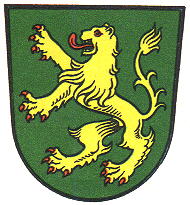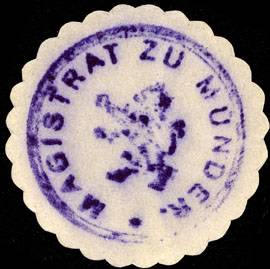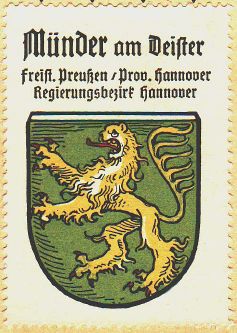Bad Münder am Deister: Difference between revisions
Knorrepoes (talk | contribs) m (Text replacement - "Literature" to "Literature") |
Knorrepoes (talk | contribs) m (Text replacement - "ö" to "ö") |
||
| Line 6: | Line 6: | ||
State : [[Niedersachsen]]<br/> | State : [[Niedersachsen]]<br/> | ||
District (Kreis) : [[Hameln-Pyrmont]] (until 1973 [[Springe (kreis)|Springe]])<br/> | District (Kreis) : [[Hameln-Pyrmont]] (until 1973 [[Springe (kreis)|Springe]])<br/> | ||
Additions : 1972 Bakede, Beber, | Additions : 1972 Bakede, Beber, Böbber,Brullsen,Egestorf (Süntel),Eimbeckhausen, Flegessen, Hachmühlen, Hamelspringe, Hasperde, Klein Sünte, Luttringhausen, | ||
Nettelrede, Nienstedt, Rohrsen | Nettelrede, Nienstedt, Rohrsen | ||
Revision as of 05:39, 5 October 2016
This page is part of the German heraldry portal Deutsche Wappensammlung |
Heraldry of the World |
|
German heraldry:
|
Selected collector's items from Germany:
|
BAD MÜNDER AM DEISTER
State : Niedersachsen
District (Kreis) : Hameln-Pyrmont (until 1973 Springe)
Additions : 1972 Bakede, Beber, Böbber,Brullsen,Egestorf (Süntel),Eimbeckhausen, Flegessen, Hachmühlen, Hamelspringe, Hasperde, Klein Sünte, Luttringhausen,
Nettelrede, Nienstedt, Rohrsen
Origin/meaning
The town became a city in the 13th century, and the first seal dates from 1309. It showed two crosses, the symbol for St. Peter, the patron saint of Minden; the city at the time was ruled by the Bishops of Minden. In the first decade of the 14th century the Dukes of Lüneburg acquired the city. The second known seal, dating from 1318, thus showed the lion of the Dukes of Lüneburg. Ever since the city uses the lion, at first passant, and since the 17th century in the present shape.
| Seal from around 1900 |
The arms by Hupp in the Kaffee Hag albums +/- 1925 |
Contact and Support
Partners:
Your logo here ?
Contact us
© since 1995, Heraldry of the World, Ralf Hartemink 
Index of the site
Literature : Stadler, K. : Deutsche Wappen - Bundesrepublik Deutschland. Angelsachsen Verlag, 1964-1971, 8 volumes.














